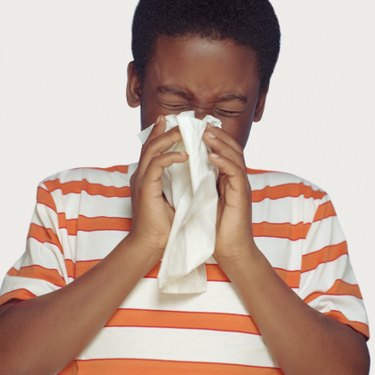
According to the National Institutes of Health, the three most common symptoms of a cold are sneezing, a runny nose and nasal congestion. Along with aches, sore throat and cough, however, loss of appetite is another frequent symptom. A few physical factors combine to result in decreased feelings of hunger when a person is sick with a cold.
Theories/Speculation
Video of the Day
It's important to realize that not everyone who has a head cold experiences a loss of appetite, and it's not a symptom that occurs as often as some others. Still, it does happen frequently, and doctors have a variety of ideas about why it may occur. According to CNN's Debra Alban, experiencing a stuffy nose robs people of the ability to smell, so they lose their appetites as well. Cardiff University argues that the symptom is due to infection-fighting chemicals that circulate in the brain and order the body to conserve all energy to banish the cold.
Video of the Day
Chicken Soup
Chicken soup is one of the most common foods served to cold patients, and there may actually be valid scientific reasoning behind why it helps. Even if people with colds don't feel hungry, the congestion in their nasal passages may clear up when they inhale the steam from the hot soup. The National Institutes of Health adds that the fluid and salt present in the soup can be beneficial for fighting cold viruses.
Warning
People who neglect eating or drinking when they have a cold because they do not feel hungry or thirsty may be more likely to experience dehydration, adverse health effects or worsening symptoms. The body needs adequate calories and nutrients to successfully heal and ward off infections, and shortchanging it on those supplies can be harmful.
Remedies
In the article for CNN, Dr. Priya Sampathkumar, a Mayo Clinic infectious disease specialist, emphasizes that regardless of appetite, people with colds should eat whatever feels good and is appealing to them at the time, whether it's soup or Popsicles. Drinking fluids is also vital. MayoClinic.com notes that broth, water, juice and other nonalcoholic and decaffeinated beverages are needed to prevent dehydration and replace fluids lost when the body produces mucus or sweats during a fever.
Prevention/Solution
Some cold viruses are very contagious. Though it's tough to always guard against catching them, there are helpful prevention measures to take. The New York Times' health guide recommends frequent handwashing, regular disinfecting and cleaning of surfaces at home, using hand sanitizers, getting adequate sleep and drinking plenty of water.
Is this an emergency? If you are experiencing serious medical symptoms, please see the National Library of Medicine’s list of signs you need emergency medical attention or call 911.